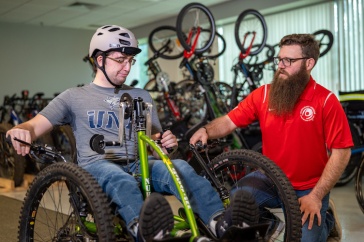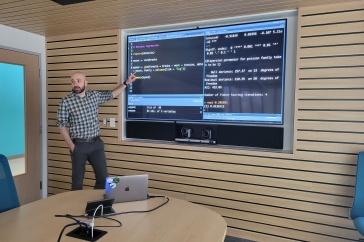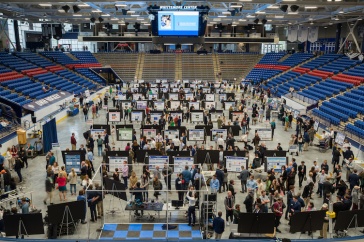
More than the pounding headaches and light sensitivity, the nausea and the trouble sleeping, it was the short-term memory loss that concerned Mark Lenzi ’97.
LENZI’S grandfather had been diagnosed with Alzheimer’s disease at about 45 years old — an age that Lenzi was fast approaching. That, and the fact that he was struggling to come up with the names of tools he worked with on a daily basis — so noticeably that colleagues had mentioned his forgetfulness— scared him.
But Lenzi’s wife, Kristina, was suffering from headaches and lightheadedness, too, and the couple reasoned it was because of the persistent smog in Guangzhou, China, where they were living with their two young children. It was late 2017 and the family had been in Guangzhou for a little over a year at the U.S. Consulate General, where Lenzi was working as a security engineering officer.

As the calendar turned to 2018, however, the headaches intensified, and Lenzi found himself struggling to remember 5-digit number codes that were essential to his job. Even more ominous, a number of his co-workers and neighbors were reporting similar symptoms, and his children — ages 3 and 7 — were having frequent bloody noses at night. And then there were the bizarre noises seemingly on the ceiling of his apartment: something that sounded like ball bearings dropped on glass, then rolling into a funnel at an accelerating speed. As the evidence mounted and his closest American neighbor was medically evacuated by the State Department, Lenzi came to a grim conclusion: he, his family and others working at the consulate were experiencing the effects of a standoff technical attack — damaging pulsed microwave radio frequency energy being used as a weapon by agents of a foreign government.
In late May 2018, Lenzi experienced several episodes of headaches so severe he feared he might not survive them, and he and his wife both failed brain injury tests administered by State Department doctors. On June 6, he and his family were evacuated from Guangzhou, through Los Angeles International Airport and on to Philadelphia, where he was evaluated at the University of Pennsylvania Center for Brain Injury and Repair.
What followed were weeks of neuropsychological testing, multiple MRIs — and, as Lenzi’s headaches continued, a consultation in New York City with Teena Shetty, M.D., one of the leading neurologists in the U.S. After hours of concussion testing, Shetty made a definitive diagnosis: despite the fact that he had never taken a blow to the head, Lenzi was suffering from the effects of a mild traumatic brain injury. In July, UPenn added him to a closely guarded study of more than 40 U.S. diplomats with “acquired brain injury.”
Placed on medical leave by the State Department, Lenzi turned to home to heal. That meant Barrington, New Hampshire, where his family roots run deep. That also meant UNH. “Twice I thought I was going to die from these headaches,” he says. “Nothing focuses the mind like if you think you’re going to die, right? It was kind of going through the back of my mind, things that were familiar to me and things I needed to get back to. I needed to get back to Barrington and see my family. I needed to get back to UNH. Get back here on the track.”
FACING THREATS
On a Friday morning late in August, Lenzi sits in a quiet conference room in the Watkins Center for Student- Athlete Excellence at the UNH Field House and describes in a matter-of-fact manner the way a foreign government could execute an attack on his apartment and that of his closest American neighbor. He then shares an MRI imaging report that describes a precise match between his cognitive symptoms and the regions of his brain that showed damage, and that are responsible for those same cognitive functions. Tellingly, the symptoms he and others in Guangzhou experienced closely mirror those of some 25 U.S. Embassy staffers in Havana, Cuba, who sustained similar brain injuries in 2016 and 2017 under similar circumstances. Those diplomats, along with Lenzi and 14 of his colleagues from China, are part of the UPenn study, which will monitor them for long-term damage and outcomes for at least four more years.
“It’s been said we’re the only known people in human history to receive a diagnosis of traumatic brain injury without a blow to the head,” he says.

Although Shetty, the New York neurologist, quickly succeeded in getting his headaches under control, months after leaving China, Lenzi continued to experience significant cognitive and vestibular deficits. Specialists at UPenn and in New York determined that his recovery would require physical, speech, eye convergence and vestibular therapy. Following through on the thoughts of home he’d clung to at the end of his time in Guangzhou, he arranged to do the bulk of his cognitive rehabilitation at Wentworth-Douglass Hospital in Dover, where he was born. To rebuild his strength and balance, he turned to UNH head track coach Jim Boulanger ’75 and the familiar lanes of the Field House’s Paul Sweet Oval.
A standout sprinter at St. Mary’s Academy in Dover, Lenzi had enrolled at UNH intending to juggle Division 1 track with an engineering major, but soon realized he was having trouble managing both. Following a strong performance at a meet against Maine his freshman year, Lenzi decided he should drop engineering and focus on track. He turned to Boulanger to bless his decision — but the coach was having none of that.
“My message was, this is what you have to do: You’ve got to step away,” Boulanger recalls. “The program has always been about academics first and then athletics.That’s the key. Get your degree.”
Reluctantly, Lenzi left the team and went on to get his degree in civil engineering with minors in political science, hydrology and water resource management. He also climbed from struggling academically to earning a Fulbright scholarship. After UNH, he spent a couple of years in the Peace Corps as an environmental engineer in Poland, worked as a deputy spokesman on Sen. John McCain’s presidential campaign in 2007 and 2008, and then worked for the Republican National Committee as spokesman for the New Hampshire Republican Party. Since 2011, he has been with the U.S. Foreign Service as a security engineering officer for the Department of State’s Diplomatic Security Service. Fluent in Polish, Russian and Ukrainian, he has been to more than 70 countries and worked in all 15 former Soviet Republics.

He worked on the ground for the International Republican Institute during two revolutions — in the former Soviet republic of Georgia and in Ukraine — that brought two pro-American leaders to power.
Lenzi’s is a world most of us know only from television or the movies, one of combating espionage and terrorism in State Department facilities around the globe. The primary mission is technical counterintelligence — trying to prevent and neutralize electronic threats against America’s embassies and consulates abroad. The assignments and the locations can be dangerous.
Lenzi believes that the attacks he and his colleagues in China and Cuba experienced were not the work of those governments but rather a diferent, hostile government with which he “has a long history” that wanted to foment discord in the United States’ relations with China and Cuba. In the case of China, Lenzi says that the medical evacuees included a disproportionate number of foreign commercial service officers, who speak Mandarin and whose role was to connect U.S. and Chinese businesses. The Chinese government values and appreciates these officers more than any other U.S. diplomats and would not want anything to happen to them, Lenzi says.
A quarter of a century after going to see Boulanger about his collegiate sprinting career and hearing not what he wanted but words and wisdom that he ultimately came to appreciate, Lenzi again sought out his coach, this time looking for permission to use the indoor track — and perhaps a sympathetic ear. Boulanger’s late older brother, John, had been in charge of State Department security during his career and was assigned to some of the same danger-filled places Lenzi had been, and Lenzi figured Boulanger might be someone he could talk to about the things he’d experienced. Ironically, however, he found himself once again on the receiving end of unwelcome advice from his coach.
Doctors at UPenn had told Lenzi that many of the other diplomats in the Cuba/China cohort had success meeting with psychologists to talk about the attacks and how to deal emotionally with the vestibular, physical and cognitive therapies required for their recovery. Lenzi resisted the idea. He was working out. His cognitive therapy was working. He was getting better. Why start opening up about his feelings to a stranger now?
He broached the subject with Boulanger, expecting and hoping his former coach would agree that their conversations would suffice. Instead, Boulanger suggested that if others were having success moving on from the attacks and their injuries in part by talking about their emotions, why should Lenzi not add that to his regimen, as well? He pointed Lenzi to Tim Churchard ’67, a sports performance coach just down the hall in the Field House and a two-sport athlete in football and hockey during his own student days.
“I can’t tell you how much I did not want to be there the first time I met with him,” Lenzi says with a laugh. “Especially when I walked into his office and saw two guitars and some papers with handwritten poetry scattered on his desk. It looked like something straight out of ‘Good Will Hunting’.”
What he soon discovered, however, was that Churchard was someone he could talk to who would understand his issues and not judge him. Churchard listened when Lenzi described unsavory assignments and counterterrorism tasks he had taken on. Churchard listened as Lenzi talked about using his sprinting ability in tight spots overseas, like the time he ran away from a South Ossetian border guard with a Kalishnikov who was trying to detain him not long before the Russian- Georgian war in 2008. Churchard listened when Lenzi said the toughest part for both him and his wife was knowing what they had put their children through.

“When I think about both of my kids having bloody noses a lot there at night, which ceased as soon as we evacuated our apartment, I still wrestle with the fact that I should have gotten us all out of that apartment earlier than I did,” Lenzi says. “That is still hard for me to deal with emotionally, especially when I speak with my affected colleagues from Cuba and China whose children also had frequent bloody noses that stopped when they were medevac’d.”
Now Lenzi swears by his sessions with Churchard, who he regards as a mentor and says he would trust with his life. Just as he swears by Boulanger and UNH director of athletics Marty Scarano, who helped get him reconnected to the university in the first place and bolstered his spirits with sideline passes to UNH football games at Villanova and Colorado.
Lenzi says his relationships with “Coaches B and C” are helpful for his kids to see and learn from as well. “They see and hear stories of me overseas ordering around U.S. Marine security guards and Navy Seabees, but back at UNH they see that I would walk over hot coals if either coach told me to do so, and they understand the utmost respect I have for both men,” Lenzi says. “I was listening to my 4-year-old son talk to himself playing Legos in another room recently and had to laugh when I heard a ‘Coach B’ curtly bossing me around at a fire station.”
For his part, Churchard says he has gained as much from his relationship with Lenzi as he has given. “Mark has some real gifts in terms of connecting with people,” he says. “That’s something he’s really good at. His experiences are incredible, if you think about the things he’s accomplished.”
A GREATER PURPOSE
A year and a half after leaving Guangzhou, Lenzi continues with his vestibular, cognitive, eye convergence and physical therapies and works for the State Department out of the National Passport Center at Pease International Tradeport in Portsmouth. In September, he regained his medical clearance to work abroad and began laying the groundwork for returning overseas to the security engineering work he loves, hopefully as soon as next summer. While those pieces fall into place, he continues to deepen and expand his connections at UNH.
Much as he was steered to Churchard by Boulanger, Lenzi was steered to Ivan Niyomugabo ’19, a fifth-year senior on the UNH football team, by Churchard. Lenzi loves the leadership, athletic and academic qualities he sees in Niyomugabo, a native of Rwanda, and relishes the idea of helping the young athlete pursue a Fulbright scholarship — and perhaps a career in government or a service-related field — down the road.
In that same vein, he is helping Jeanne Sokolowski, director of the UNH office of national fellowships, in interviewing applicants for Fulbright scholar positions. He’s also volunteering his time and his medical case to psychology professor Robert Ross, who runs UNH’s laboratory of brain science and cognition.
He has designs on giving back in other lasting ways, as well.
One of the many things Lenzi has come to appreciate from his relationship with Churchard is the value of a liberal arts education. When he was in school, he says, he was something of an engineering snob. He resented the fact that he had to leave the track team because of the demands of his major and that it took five years to complete his degree requirements. Churchard has helped broaden his thinking, he says.
“Liberal arts majors have this worldliness and often this hunger to learn about a bunch of different things that I think a lot of times is lacking in engineering,” he says. “I see a lot of liberal arts majors who are a lot more well-rounded, let’s say, than engineering majors.” What he would like to do, with the assistance of his contacts in the political and governmental worlds, is develop a UNH scholarship for engineering students who pursue a dual degree with a liberal arts discipline such as political science or a language.

“I think it would be great not only for UNH, but for national security structures and the U.S. government writ large to have these types of people,” Lenzi says. “In these Fulbright interviews I have seen the outstanding quality of UNH students and know that some would really benefit from a scholarship for dual majors. In turn, this could give tremendous benefit to the U.S. government should these students eventually go into government service.”
For now, Lenzi works out on the track at UNH. He runs routes and catches passes from Niyomugabo on the football field while discussing Fulbright possibilities and the future that awaits the young quarterback. During the summer, he made long daily swims to an island with a huge split rock on Swain’s Lake in Barrington that has been in his family for generations, and he’ll skate and cross-country ski out there this winter. He looks forward to his workout sessions on the UNH track and his weekly get-togethers with Churchard. He’s excited about the chance to be involved with psychology professor Ross and with the Fulbright program.
And as for those who might wonder why he’s eager to return to overseas counterintelligence work, a job that put both him and his family in such harm’s way not even two years ago, he points to a quote that’s posted on Boulanger’s door — one that convinced him he was right where he needed to be when he turned to his alma mater for help last summer. The closing words of the quote read, “A greater-than-self purpose not only makes the world a better place, it makes you a better you.”
“That note sums up perfectly why I joined the John McCain campaign,” Lenzi says. “McCain always said to me and others that the best thing in life that you can do is serve a cause greater than yourself. That’s what I’ve tried to live my life by.”
He’s proud of the ability and experience he brings to the work he does and the role he plays in keeping embassies and representatives of the U.S. government safe. That’s not to say there aren’t still moments he feels irritable or quick to anger in the wake of his injury and what he and his family have been through. “I understand that. I recognize that,” he says. “But I’m at a point where I find myself, not only through prayer, but just in general, being thankful for the people I have in my life. And thankful for UNH being in my life.”
-
Written By:
Allen Lessels '76 | UNH Athletics
















































